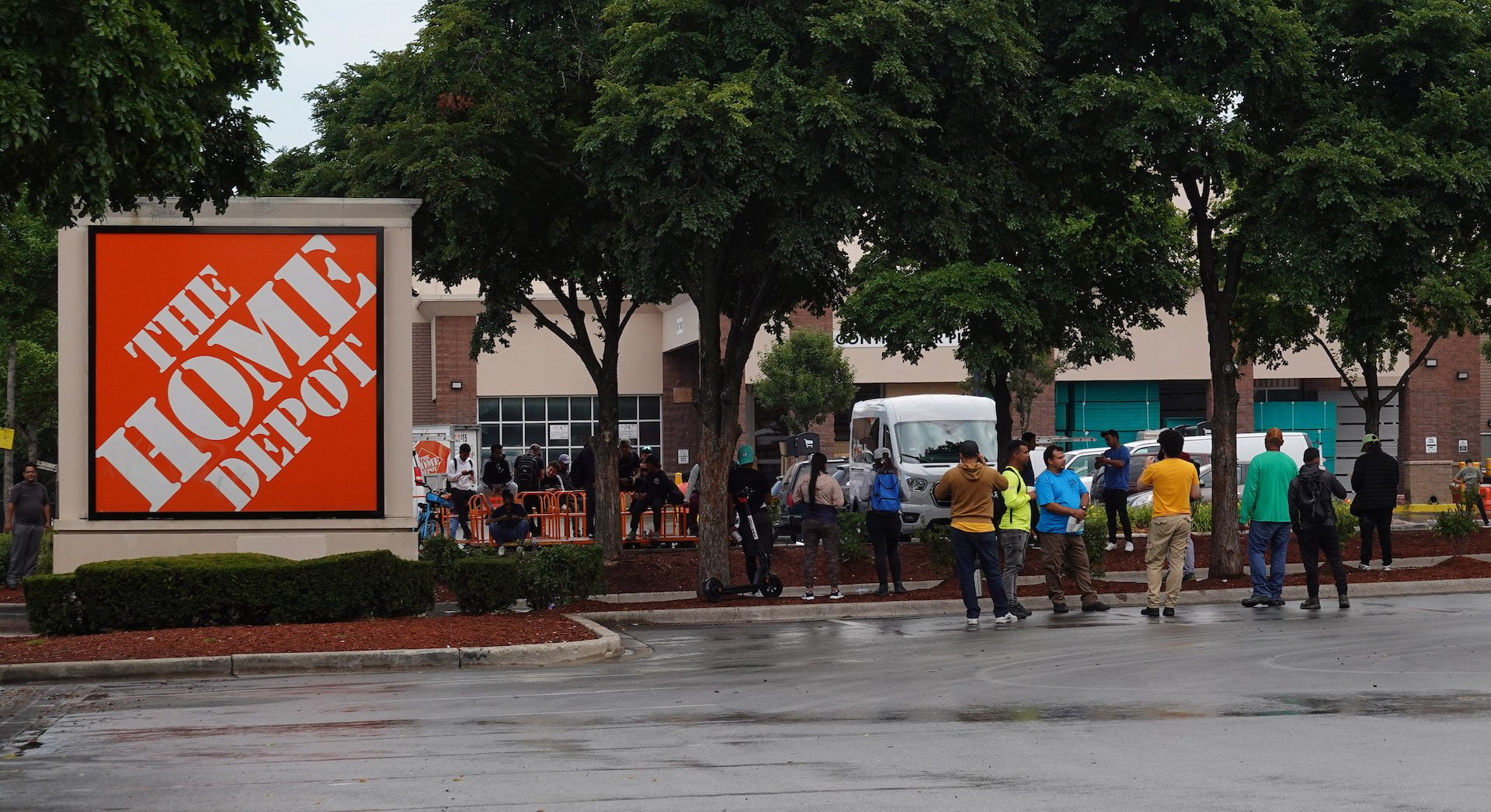 Abel Uribe para Borderless Magazine
Abel Uribe para Borderless MagazineDesde el robo de salarios a los sitios de trabajo inseguros, cómo navegar por sus derechos como jornalero, independientemente de su estatus migratorio en Illinois.
Como todos los trabajadores, los jornaleros gozan de la misma protección jurídica que los demás trabajadores estadounidenses, independientemente de su estatus migratorio, en virtud de la Ley de Normas Laborales Justas (FLSA).
Incluso con estas protecciones, los jornaleros sufren robos de salario, amenazas y condiciones de trabajo peligrosas.
Borderless ha creado una guía de recursos para ayudar a los jornaleros a conocer sus derechos y los recursos disponibles en caso de robo de salarios, condiciones inseguras o amenazas.
Noticias que ponen el poder en el punto de mira y a las comunidades en el centro.
Suscríbase a nuestro boletín gratuito y reciba actualizaciones dos veces por semana.
Cobrar
Como jornalero, debes cobrar al menos el salario mínimo federal por todo tu tiempo de trabajo, incluida la formación y los desplazamientos. Estados como Illinois tienen protecciones adicionales. Por ejemplo, Illinois exige a las empresas que contratan jornaleros durante más de 90 días que paguen el mismo salario y reciban prestaciones equivalentes a las de otros empleados.
Si su empleador ha vulnerado sus derechos como jornalero, puede presentar una denuncia en línea ante el Departamento de Trabajo de Illinois. aquí. También puedes presentar una denuncia ante la Oficina de Normas Laborales de Chicago llamando al 311.
También puede emprender acciones legales presentando una demanda civil ante un abogado privado o un grupo de asistencia jurídica.
Garantizar la seguridad en el trabajo
La legislación federal obliga a las empresas a mantener un lugar de trabajo seguro y libre de riesgos conocidos para la salud y la seguridad. Los trabajadores pueden hablar de sus problemas de seguridad sin temor a represalias.
He aquí algunas cuestiones básicas de seguridad a tener en cuenta en un lugar de trabajo:
- ¿Tienes una escalera del tamaño adecuado? ¿Es robusta?
- Si estás trabajando en un andamio, ¿es lo suficientemente grande como para sostenerte a ti y a otros trabajadores? ¿Se ha sometido el andamio a pruebas recientemente?
- Si está trabajando en una zanja profunda, querrá asegurarse de que existen protecciones para evitar un derrumbe.
- Si trabajas con productos químicos, ¿tienes guantes y gafas para protegerte?
- Si levantas o mueves equipos o maquinaria pesada, ¿has recibido formación sobre los peligros y las formas de protegerte?
- Si trabajas en condiciones de calor, ¿tienes acceso a agua potable? ¿Tienes acceso a pausas para refrescarte?
Si cree que su lugar de trabajo no es seguro, puede presentar una denuncia confidencial y solicitar una inspección por parte del Administración de Seguridad y Salud en el Trabajo (OSHA) aquí.
También puede ponerse en contacto con ellos si su empresa le amenaza con despedirle o toma represalias contra usted si se queja a la OSHA. Puede ponerse en contacto con la oficina local de Chicago en el teléfono (312) 793-7308.
Protegerse
Es esencial que documentes el trabajo que realizas. La documentación debe incluir el nombre del empleador, el salario, el lugar, el tipo de trabajo realizado, la fecha y la hora de inicio y finalización. Si es posible, haz una foto de la matrícula del empresario. Lo mismo se aplica si trabajas para un contratista.
También puede compartir estos datos con amigos, familiares o compañeros jornaleros.
Si es víctima o testigo de infracciones de las leyes laborales o de empleo y no tiene documentos que le permitan estar en EE.UU., puede ponerse en contacto con un organización sindical y pedir deferencia. Esto proporcionará hasta cuatro años de permiso de trabajo. La agencia laboral se pondrá en contacto con el Departamento de Seguridad Nacional (DHS) de EE.UU., que investigará su denuncia y su situación. El DHS ofrece "protección discrecional caso por caso".
Protección de los niños trabajadores
Las leyes de Estados Unidos y del estado de Illinois protegen a los niños trabajadores. El Departamento de Trabajo de Illinois establece las condiciones para los niños trabajadores menores de 16 años. Si crees que un niño ha sufrido abusos en el trabajo, trabaja en una situación peligrosa o no ha cobrado, ponte en contacto con el organismo estatal.
Puede denunciar posibles infracciones en materia de trabajo infantil a la Departamento de Trabajo de Illinois. La legislación estadounidense también protege a los menores trabajadores, y puedes ponerte en contacto con la División de Salarios y Horas del Departamento de Trabajo de Estados Unidos, en Chicago, llamando al 312-789-2950.
Grupos y organizaciones comunitarios a los que puede dirigirse en busca de apoyo
Si tienes problemas como salarios robados, condiciones inseguras o amenazas de quienes te contratan, aquí tienes organizaciones que pueden ayudar a los jornaleros:
Dirección: 1 LaSalle St., Suite 1275, Chicago, 60602;
Tel: 312 795 9115
Raise the Floor es una coalición de siete organizaciones que ayudan a los trabajadores y pueden dirigirte a las especializadas en jornaleros. Algunos de estos grupos pueden ayudarte a presentar denuncias y encontrar apoyo para tu protección. Son:
Dirección: 1700 W. Hubbard, 2E, Chicago, IL 60622
Teléfono: 773.769.6000.
Arise ofrece apoyo y un manual de derechos de los trabajadores en español, polaco e inglés.
Puede encontrar su manual del trabajador aquí.
Comunidad de Chicago y derechos de los trabajadores,
Dirección: 1801 S Ashland Ave, Chicago, IL 60608
Teléfono: (773) 653-3664.
CCWR es una organización dirigida por trabajadores inmigrantes que ofrece apoyo contra los abusos laborales y formación sobre los derechos de los trabajadores y cómo organizarse en el lugar de trabajo.
Colaboración de Trabajadores de Chicago
Ubicaciones:
1914 S Ashland Ave, Chicago, IL 60608
300 Grand Ave, Waukegan, IL 60085
783 Highland Ave, Elgin, IL 60123
Teléfono: 847-596-7491
El CWC defiende los derechos de los trabajadores y les ayuda a enfrentarse a problemas laborales como el acoso sexual, la discriminación racial y LGBTQ, entre otros. Ofrece apoyo en inglés y español.
Dirección: 4811 N Central Park, Chicago, IL 60625
Teléfono: 312-491-9044
Latino Union es un centro de contratación de jornaleros. También ofrece talleres, clases y apoyo para presentar denuncias por robo de salario en inglés y español.


